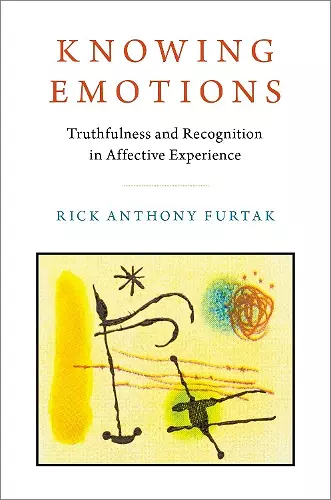Knowing Emotions
Truthfulness and Recognition in Affective Experience
Format:Hardback
Publisher:Oxford University Press Inc
Published:5th Apr '18
Currently unavailable, currently targeted to be due back around 11th February 2025, but could change
This hardback is available in another edition too:
- Paperback£39.99(9780190099794)

How do our emotions enable us to know? When Pascal noted that the heart has its own reasons, he implied that our rational faculty alone cannot grasp what is revealed in affective experience. Knowing Emotions seeks to explain comprehensively why human emotions are more than physiological disturbances, but experiences capable of making us aware of significant truths that we could not know by any other means. Recent philosophical and interdisciplinary research on the emotions has been dominated by a renewal of the debate over how best to characterize the intentionality of emotions as well as their bodily character. Rick Anthony Furtak frames this debate differently, however, arguing that intentionality and feeling are not two discrete parts of affective experience, but conceptually distinguishable aspects of a unified response. His account captures how an emotion's phenomenal or 'felt' quality (what it is like) relates to its intentional content (what it is about). Knowing Emotions provides a solid introduction to the philosophy of emotion before delving into the debates that surround it. Furtak draws from a wide range of analytic and Continental philosophers, including Sartre, Merleau-Ponty, Kierkegaard, and Nietzsche, among others, and bolsters his analysis with empirical evidence from social psychology, neuroscience, and psychiatry. Perhaps most importantly, Furtak investigates all varieties of affective experience, from brief episodes to moods and emotional dispositions, loves and other longstanding concerns, and overall patterns of temperament and affective outlook. Ultimately, he argues that we must reject the misguided aspiration to purify ourselves of passion and attain an impersonal standpoint. Knowing Emotions attempts to clarify what kind of truth may be revealed through emotion, and what can be known - not despite, but precisely by virtue of, each person's idiosyncratic perspective.
In laying the foundations for his own argument, Furtak provides an excellent overview of the dominant theories of emotion and how they have been taken up by philosophers without reflection on the ongoing developments in psychology and neurobiology. * Karen Simecek, Affect Theory *
In Knowing Emotions, Furtak provides a compelling argument that our emotions are the source of invaluable and irreplaceable truth about ourselves and what truly matters to us. * Katherine Oktober Matthews, Riding the Dragon: Consolation for Artists and Intellectuals *
Rick Furtak's excellent book offers a plausible and attractive view of the nature of the emotions. Writing against the widespread tendency to see emotions as illogical (or alogical) brute psychological occurrences, Furtak reminds us that 'our emotions have a reasonableness or 'logic' of their own.' He is especially skillful when criticizing the hasty and overambitious conclusions frequently drawn from empirical research into the emotions and exposing the unjustified assumptions that are so often smuggled into the interpretations of such research. All in all, this is an enlightening, persuasive, and, I think, important book. Readers who are currently skeptical about the idea that emotions aim at truth may well have their minds changed, while those who are already sympathetic to the basic idea may find their understandings deepened and enriched by Furtak's careful and insightful argumentation. * Troy Jollimore, California State University, Chico *
With compelling arguments, command of the latest scientific research, and an impressive depth of human insight, Rick Furtak's Knowing Emotions makes a most welcome addition to the philosophical literature on emotions. Furtak departs from other defenses of a cognitive conception of emotions by emphasizing the intelligent, world-revealing nature of the living body. He argues convincingly that our embodied emotional responses enable us to perceive features of the world that would otherwise remain unknown to us. Elegantly and clearly written, this book is valuable not only to professional philosophers but also to anyone seeking deeper human understanding. * Martha C. Nussbaum, School of Law and Department of Philosophy, University of Chicago *
This book is a clear and engaging account of the many ways in which our emotional responses can light up the significance of the world. Furtak's beautifully crafted discussion exhibits the analytical precision of serious philosophical writing, but also, in its handling of literary examples, the interpersonal sensitivity that is required for a rounded appreciation of the contribution of the emotions to the well-lived human life. * Mark Wynn, Professor of Philosophy and Religion, University of Leeds *
In this original and thoroughly engaging book, Rick Furtak argues that emotions consist in a distinctive kind of bodily cognition, which reveals truths about the world and other people that would otherwise be inaccessible to us. His discussion is clear and compelling throughout, providing important new insights into the relationships between emotion, feeling, evaluation, belief, and interpersonal experience. The book should be essential reading not just for philosophers but for anyone working on emotion. * Matthew Ratcliffe, Professor for Theoretical Philosophy, University of Vienna *
Furtak offers readers an inviting view of the nature of emotions and the role they play in human existence as conduits to truth. ... The language of this book is clear and free of jargon and should provide an excellent guide to emotions as they are actually lived for a wide range of interested readers, from beginning students and seasoned academics to those in the healing professions. * Michael Uebel, Choice *
For much of [Furtak's book] I found myself nodding in agreement. ... Furtak has set out to explain how the 'somatic agitation we feel when we are affectively moved might actually contribute to the way that the emotions inform us about how things are going in our world of concern.' It is a worthy goal. * Ronald de Sousa, Journal of Philosophy of Emotion *
ISBN: 9780190492045
Dimensions: 142mm x 211mm x 18mm
Weight: 386g
248 pages